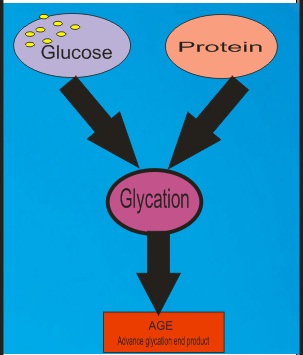Advanced Glycation End Products (AGEs):
Impact on Human Health, Prevention, and Dietary and Lifestyle Approaches
Introduction:
Advanced Glycation End Products (AGEs) are a group of compounds formed in the body as a result of a non-enzymatic reaction between sugars and proteins, lipids, or nucleic acids. This process, known as glycation, occurs naturally in the body, but excessive production and accumulation of AGEs have been linked to various health issues. This article aims to provide an overview of AGEs, their impact on human health, preventive measures, the role of processed foods in AGE formation, dietary approaches to prevent AGEs, and lifestyle factors that can mitigate AGE formation.
What are Advanced Glycation End Products (AGEs)?
AGEs are a diverse group of molecules that form when sugar molecules attach to proteins, lipids, or nucleic acids through a process called glycation. This reaction occurs spontaneously, particularly in conditions of high blood sugar levels or oxidative stress. AGEs can accumulate in tissues and organs throughout the body over time, leading to various pathological changes and chronic health conditions.
Impact of AGEs on Human Health:
Oxidative stress:
AGEs promote oxidative stress, a condition where the balance between harmful free radicals and antioxidants is disrupted. This imbalance can contribute to cellular damage, inflammation, and the development of chronic diseases such as diabetes, cardiovascular disease, and neurodegenerative disorders.
Tissue damage and aging:
AGEs accumulate in various tissues, including the skin, blood vessels, and kidneys. Their presence can impair the structure and function of these tissues, leading to accelerated aging, reduced elasticity, and increased risk of diseases such as atherosclerosis and chronic kidney disease.
Inflammation and immune dysfunction:
AGEs activate inflammatory pathways and contribute to chronic low-grade inflammation. Prolonged inflammation can disrupt normal immune function, impair wound healing, and contribute to the development of autoimmune disorders.
Preventing Advanced Glycation End Products (AGEs):
Minimizing processed foods:
Processed foods, especially those high in sugar and fat, are a significant source of AGEs in the diet. By reducing the consumption of processed and fried foods, individuals can lower their intake of AGEs and subsequently decrease the burden of AGE-related health issues.
Cooking methods and food preparation:
Certain cooking methods, such as grilling, frying, and broiling, can promote AGE formation. Opting for gentler cooking methods like steaming, boiling, or stewing can help reduce AGE production. Marinating foods with acidic ingredients like lemon juice or vinegar can also lower AGE formation.
Dietary Approaches to Prevent AGEs:
Antioxidant-rich foods: Including a variety of fruits and vegetables in the diet provides essential antioxidants that combat oxidative stress and reduce AGE formation. Berries, leafy greens, cruciferous vegetables, and herbs/spices like turmeric and cinnamon are particularly beneficial.
Omega-3 fatty acids:
Consuming foods rich in omega-3 fatty acids, such as fatty fish (salmon, mackerel), chia seeds, and flaxseeds, can help reduce AGE-related inflammation and promote overall health.
Low glycemic index (GI) foods:
Choosing foods with a lower glycemic index, such as whole grains, legumes, and non-starchy vegetables, can help regulate blood sugar levels and minimize AGE formation.
Life style to mitigate AGE formation.
To mitigate advanced glycation end product (AGE) formation and promote a healthier lifestyle, here are some recommendations:
Balanced Diet:
Consume a diet rich in whole, unprocessed foods, including fruits, vegetables, lean proteins, and whole grains. Avoid excessive intake of sugary foods, refined carbohydrates, and processed meats, as they can contribute to AGE formation.
Cooking Methods:
Opt for cooking methods that produce fewer AGEs, such as steaming, boiling, poaching, and braising. Avoid high-temperature cooking methods like frying, grilling, broiling, and barbecuing, which can increase AGE formation.
Antioxidant-Rich Foods:
Include foods high in antioxidants, such as berries, green leafy vegetables, nuts, and seeds. Antioxidants help reduce oxidative stress and AGE formation.
Limit Sugar Intake:
Minimize your consumption of sugary foods and beverages. Excess sugar can react with proteins in your body, leading to the formation of AGEs.
Control Blood Sugar Levels:
If you have diabetes or prediabetes, it’s crucial to manage your blood sugar levels effectively. Consistently high blood sugar can accelerate AGE formation.
Regular Exercise:
Engage in regular physical activity, as it helps improve insulin sensitivity and blood sugar control. Exercise also promotes overall cardiovascular health and can reduce the risk of chronic diseases associated with AGE formation.
Adequate Hydration:
Drink plenty of water to maintain hydration levels. Sufficient hydration can support kidney function, which plays a role in the elimination of AGEs from the body.
Avoid Smoking and Limit Alcohol:
Smoking and excessive alcohol consumption can increase oxidative stress and contribute to AGE formation. Quit smoking and consume alcohol in moderation, if at all.
Stress Management:
Chronic stress can accelerate aging processes, including AGE formation. Incorporate stress-reducing practices into your lifestyle, such as meditation, deep breathing exercises, yoga, or engaging in hobbies you enjoy.
Sleep Well:
Prioritize quality sleep to allow your body to repair and regenerate. Aim for 7-9 hours of uninterrupted sleep each night.
Maintain a Healthy Weight:
Obesity and excess body fat can contribute to inflammation and oxidative stress, promoting AGE formation. Maintain a healthy weight through a balanced diet and regular exercise.
Remember that making small, sustainable changes to your lifestyle over time is key to long-term success.
Consult with a healthcare professional or registered dietitian for personalized advice based on your specific health needs.
{Nutrition Life Circle} 

My Self Hari singh choudhary
S.N.H.S. Dip.(Holistic nutrition), London, S.N.H.S. Dip. (Advanced Nutrition), London, S.N.H.S. Dip. (Holistic Pain Management), London, S.N.H.S. Dip. (Nutrition for Age 50+), London, S.N.H.S. Dip. (Plant-Based Nutrition), London, S.N.H.S. Dip. (Vegetarian & Vegan Nutrition,) London, Certified Diabetes Educator’s (INDO-VIETNAM MEDICAL BOARD, Associate member of The International College of Holistic Medicine, England.
NATURAL DISEASE ERADICATION
[ NUTRITION THERAPY ]
For Business inquiry:-
Email: nutritionlifecircle@gmail.com
WhatsApp Number: +91 9425090558
